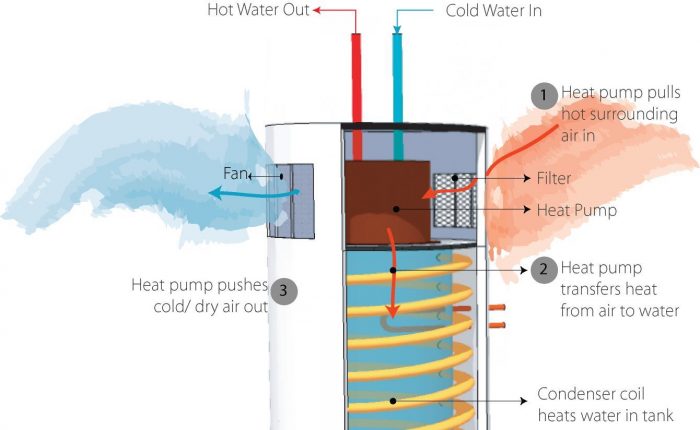
The most common type of heat pump water heater takes heat from the air and puts it into water. Of course, that’s what all heat pumps do, right? Take heat from one place and put it in another. By removing heat from the air and putting into water, though, a heat pump water heater also cools and dehumidifies the air. Which is exactly what an air conditioner does. So, can you get rid of the air conditioner and just use the heat pump water heater?
Factors to consider
The first thing we need to know is how much cooling capacity we can get from a heat pump water heater. That will depend on a number of factors, the main three being:
- Location of water heater
- Inlet water temperature
- Amount of hot water use
You won’t get any cooling in the house if the heat pump water heater isn’t located in the house. Some heat pump water heaters have the option to duct the intake or exhaust, so the water heater could be outside but sending the cool exhaust air into the house.
Temperatures can change significantly over the course of a year. The cooler the inlet water temperature is, the more heat you’ll have to extract from the air and the more cooling you’ll get. Here in Atlanta, my inlet water temperature gets up into the mid 70s Fahrenheit in summer. In a cold climate where toilet tanks sweat in summer, the water comes in colder.
Another huge factor is how much hot water you use. If you have only a couple of people in the house and do your best to conserve water, it’s probably game over right there. With several occupants in a larger house, you’ll get more cooling . . . but you’ll also need more cooling. (Hmmm. Where is this headed?)
Can it do enough cooling?
The photo below shows the temperature and relative humidity of the air being exhausted from my heat pump water heater. At 51°F, the exhaust air is definitely providing some cooling. We could do calculations to figure out how much cooling (in BTUs per hour or kilowatts) we’ll get. In fact, we have more than one way to approach the problem.
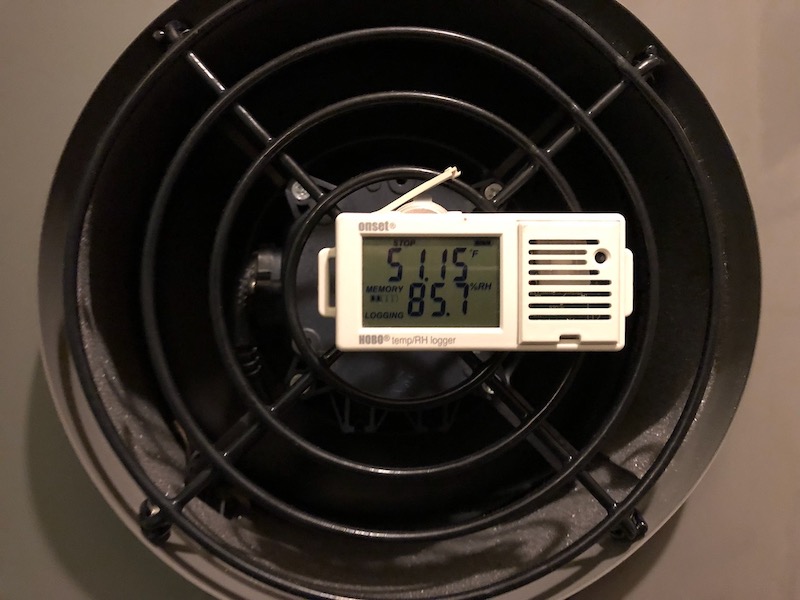
But let’s keep it simple here. The most electricity I’ve used to run my water heater in the summer is about 30 kilowatt-hours (kWh) in a month. The uniform energy factor (UEF) of my water heater is 3.7. That means it moves 3.7 units of heat from the air into the water for each unit of electricity that I pay for.
Here’s how to find the amount of heat moved into the water, and thus the amount of cooling provided to the space around the water heater.
E = 30 kWh in one month
Q = 30 kWh x 3.7 = 110 kWh (rounded)
Conversion factor: 1 kWh = 3,412 BTU
Q = 110 kWh x (3,412 BTU/kWh) = 375,000 BTU (rounded)
Wow! That sounds like a lot of cooling, doesn’t it?
Maybe it is. Maybe it isn’t. OK, it isn’t. Here’s why. Although it’s in the hundreds of thousands of BTUs, a BTU is a small amount of heat. Also, that’s the total for a whole month of water heater use. The main floor of my house has a cooling load of about 21,000 BTU per hour. Using my result above, I can calculate the hourly cooling rate of my heat pump water heater:
Q = 375,000 BTU ÷ (30 days x 24 hrs/day) = 520 BTU/hr (rounded)
So, my heat pump water heater doesn’t come close to being able to cool my house. It couldn’t even meet the cooling load of the basement (~9,000 BTU/hr), where it’s located. In fact, I’d have to have about four of them in my bedroom to meet the cooling load there. (But then I’d need four times the hot water use, too.)
Sum and substance
I’ve ignored some of the issues involved in doing a rigorous analysis of the cooling capacity of a heat pump water heater. The split between sensible and latent cooling will have some effect, as will the air temperature and the efficiency of the heat pump water heater. But with such a large discrepancy between water heater cooling capacity and the cooling load in my house, getting rid of the air conditioner is not a viable option.
Would it ever be possible? Well, for it to work, you’d need a low cooling load and probably a lot of hot water use. Having a low inlet water temperature would help, too. If your toilets sweat in summer, you have a low inlet water temperature. Building a passive house in a cold climate and using enough hot water might get you close.
For most houses, though, no, you’re not going to be able to cool and dehumidify your house with only a heat pump water heater. And that’s especially true in hot or mixed humid climates. But if you try the experiment, let me know how well it works.
________________________________________________________________________
Allison A. Bailes III, PhD is a speaker, writer, building science consultant, and the founder of Energy Vanguard in Decatur, Georgia. He has a doctorate in physics and is the author of a popular book on building science. He also writes the Energy Vanguard Blog. For more updates, you can subscribe to our newsletter and follow him on LinkedIn. Photos courtesy of author.
Weekly Newsletter
Get building science and energy efficiency advice, plus special offers, in your inbox.





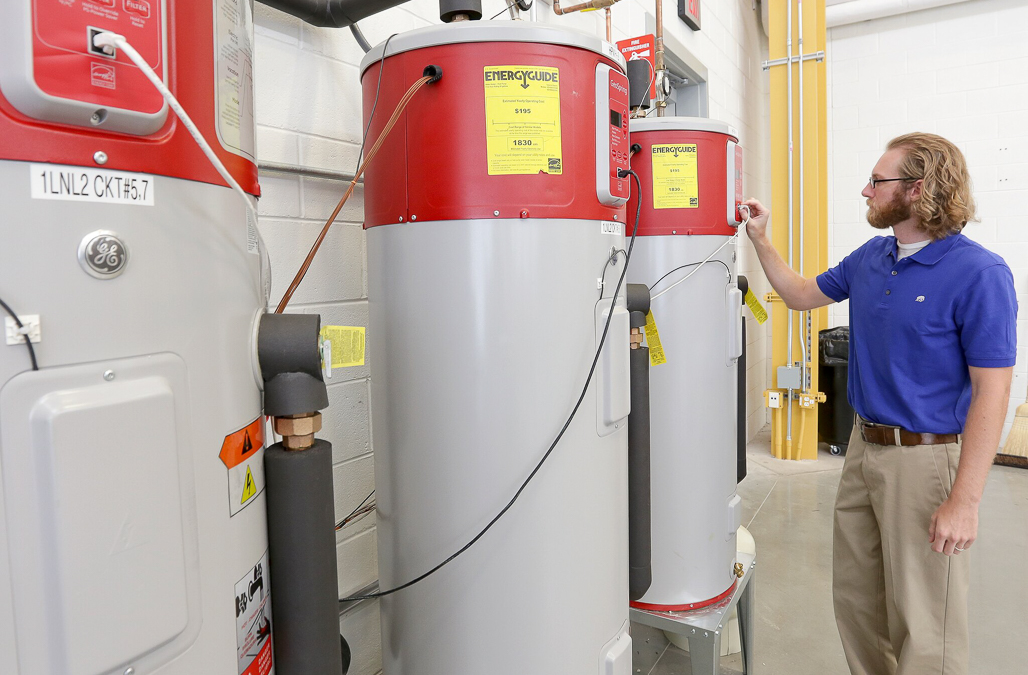
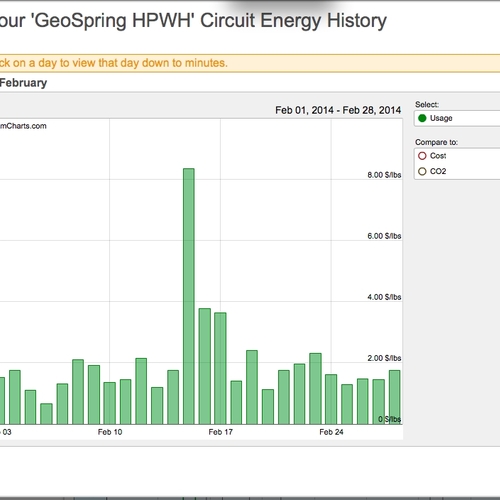
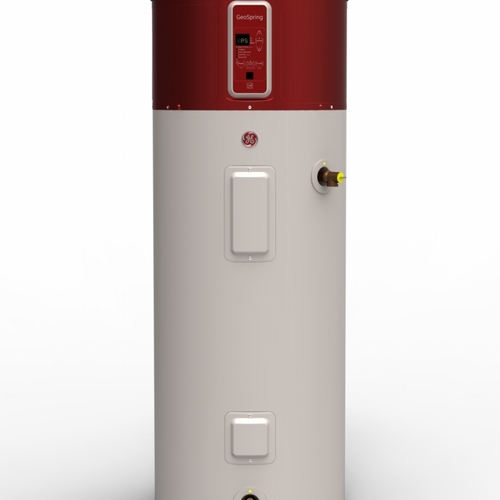
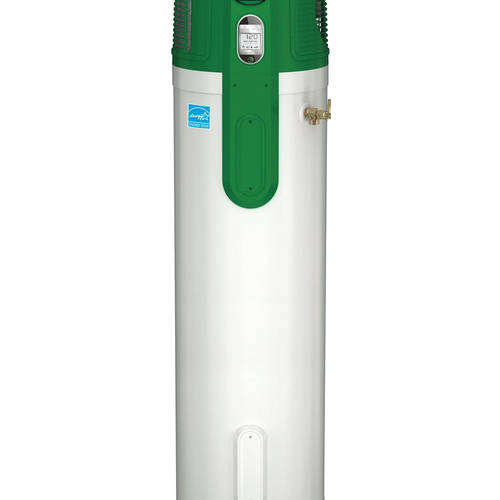






10 Comments
Thanks for this analysis. I've been curious about HP water heaters but hadn't overthought it in terms of cooling a space but I have overthought other aspects. Two are cooling a basement in winter in a cold climate and the other is the considerable noise (I've heard it said).
Lately I've been wondering if I can set up a hybrid tank-to-tankless system.
First run the water through an electric (my pref) tank heater and then through an electric tankless when called for.
The holding temp in the tank could be lowered substantially below its normal holding temp. Normally a tankless heater needs a major power circuit and draw to work well in cold climes and are costly. I live in Florida where electric tankless heaters work well (I have a Titan) and I suspect they'd be sufficient in cold temps in this application.
Any thoughts?
handyhomehacker: You'd have to check the specs for the tankless WH. There may be a maximum inlet water temperature to prevent overheating.
Another idea is to have an uninsulated tempering tank to raise the inlet water temperature to ambient conditions. You could put it in a garage or attic to heat it even more, but you'd again need to make sure you don't send too-hot water to the tankless, if there's a limit.
Thanks. Exactly what I was thinking re the tank heater holding temp.
I hadn't considered using an un-insulated passive tank in basement to hold inlet water at ambient temp.
I'm not sure what problem this is attempting to solve - you could use a larger tank or a tank with a more powerful element. No need to install a tankless unless you don't have space for a tank.
Now if you put a heat pump water heater in a theoretically perfect passivhaus enclosure, does it actually save any energy? TANSTAAFL and the energy has to come from somewhere. if you take it out of the air then it has to be replaced, doesn’t it?
Lloyd: It depends on what you're comparing it to. If the alternative is an electric resistance water heater, then yes. The net efficiency of the HPWH would be governed by the efficiency of the space heating system, so that should be higher than you can get from the strip heat in a standard water heater...unless you're actually heating said Passive House with an electric resistance blow dryer. Now, if you heat the house with a heat pump blow dryer... :~)
(presuming 110 kWh would be your equivalent energy usage for a resistive hot water heater)
Is 110kWh a reasonable average? If I look at our place, when occupied only on weekends in June 2022, we got as high as 343 kWh. Granted we have a bunch of wasteful fixtures, and live in an area where tap water is so plentiful that I don't even know if the association gets metered (we don't individually)... But still seems like a lot more!!
Put a 50g HP water heater in basement boiler room, next to guest bedroom. Built cieling duct and vented the cool air into bedroom in the summer. Home is Maine with no Central air. Does nice job of keeping the 700 Sq ft basement cool. Would not be sufficient for much more, but it's a free perk.
Allison-no disrespect, but this question a bit of a straw man-the REALLY I. Or tan t question is in mixed climates, how does the heat pump water heater fare energy wise overall-ie in winter it’s going to cost you to heat that over cooled basement. Obviously these are great in warm climates, in a garage, and whe ]re gas costly or unavailable. But what about climates zones 4 and 5 where roughly 1/3 of nations populations lives and vast majority has access to utility supplied natural gas. ? Ie mixed, and we have to trade off cooling and heating considerations .
When I was planning my rebuild I wanted to make sure I benefited from the free cold/dry air from my HPWH in one way or another. Otherwise it would have been a lost opportunity. There was no room to locate it in the attic other I would have done that to help fight against the affects of stratification. My finished basement was the only location available but pumping cold air into the lowest portion of the home was the worst thing I could think of doing when it comes to equalizing the temps throughout my home. What I ended up doing was ducting the cold dry air to below my refrigerator which is located in the kitchen on the south end of the home. The fact that it's a fridge, a kicthen and on the south end of the home helped me to justify (in my mind) having the extra cooling placed there. It works great in the summer and is a little annoying in the winter but it's far better then adding to the effects of stratification in the basement. If I had it to do over again I would not have placed it directly under the fridge because the air hits the bottom of the fridge and then spreads to fight against my heated floors during winter. I would have instead left it as a floor register next to the fridge to cool the air in the kitchen instead of having such a major cooling effect on the floor of the kicthen. Photos attached. Note one other thing: The proprietary take-off boot is from the HPWH maker is unreasonably expensive (like $100-200); I just used a $10.00 24" round duct to 8" round take-off and some tape.
Log in or create an account to post a comment.
Sign up Log in